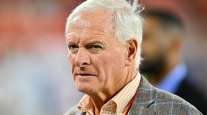Fraud Scheme Fueled by Fight for Gallons, Former Pilot Flying J Executives Testify

CHATTANOOGA, Tenn. — Of the $92 million Pilot Flying J’s board of directors has admitted its employees defrauded trucking companies, as little as 20% went directly into the pockets of those confessed conspirators, testimony has shown.
The band of sales executives who have confessed defrauding trucking companies by paying them less in diesel fuel discounts than promised faced a cap on commissions, and those who have testified in the past few weeks in U.S. District Court in Chattanooga had all reached it.
RELATED: Former Pilot Flying J exec called Jimmy Haslam after feds came to home
RELATED: Former Pilot Flying J sales executive: ‘I cheated customers and I did it well’
Sales executives Brian Mosher and Arnie Ralenkotter and salesman Chris Andrews have all testified that their commissions did not grow even as the fraud scheme grew and was poised to spread just before the truck stop giant’s Knoxville headquarters was raided on Tax Day 2013.
Commissions capped but fraud grew
Salesmen and executives who have pleaded guilty in the five-year fraud scheme were earning total salaries and bonuses ranging from $2.1 million to $625,000 annually by the time of the raid. The support staff — all women — who have pleaded guilty were making less than $100,000.
Testimony showed support staff made as little as $10 in commission on a $5,000 fraud. Ralenkotter and Mosher — both of whom have admitted they were among the top fraudsters in the scheme — have testified only 20% of their commissions stemmed from fraud.
“I’d say 80%,” Ralenkotter said when asked during testimony last month how much of his business was honestly earned.
Mosher echoed the figure.
“Isn’t it true it was part of Pilot’s culture to push for sales as hard as sales people could work?” defense attorney Jonathan Cooper asked Ralenkotter.
“Yes,” Ralenkotter answered.
Delivering gallons
He elaborated via an email he sent to his sales team at Pilot Flying J in 2008 when the fraud scheme was in its early stages.
“I don’t guess I need to reiterate what (CEO) Jimmy (Haslam) said in his update, but I’m going to anyway,” he wrote. “We need to make certain we are doing everything we can to deliver the gallons on our focus accounts. Work hard. Work smart. Find creative ways to get gallons.”
Former Pilot Flying J President Mark Hazelwood is on trial along with three subordinates on charges they, too, conspired to commit mail and wire fraud by cheating trucking companies too unsophisticated to catch it.
Hazelwood’s pay was tied to Pilot Flying J’s profitability. His attorney, Rusty Hardin, has repeatedly noted Hazelwood was making millions as the nation’s largest diesel fuel retailer added more travel centers to its roster.
Mosher, Andrews and Ralenkotter have all testified their pay also was linked to profitability. The more Pilot Flying J made, the more money they earned, the trio has testified independently of each other.
Mosher said salesmen and executives competed to get more trucking companies to commit to Pilot Flying J because it meant promotions and more money.
“A director level at Pilot Flying J … was a very big deal,” said Mosher, who snared one. “It also came with phantom stock points … profit sharing for lack of a better term.”
What ails truckers ails truck stops
Both he and Hazelwood — via a video played by defense attorney Rusty Hardin for jurors last week — said trucking companies were using technology to cut down on diesel fuel purchases and to buy their fuel at whatever truck stop gave them the best deal.
The trucking industry itself, Mosher and Hazelwood said, was facing financial strain as technology was making it cheaper to ship goods using means other than big rigs.
Hazelwood had risen through the ranks at Pilot Flying J in large part because of his program to lure in trucking companies with a more convenient payment plan. The manual rebate system that testimony has shown was used in the fraud scheme was an off shoot of that program designed for smaller trucking companies that did not have the credit to satisfy Pilot Flying J’s direct billing requirements or firms that wanted to keep its fuel deals off the books.
Mosher said it wasn’t so much the money netted from the fraud that drove the scheme but the gallons of diesel fuel Pilot Flying J sold as a result of luring in new trucking companies.
“The gallon pool is getting smaller,” he said. “Trucking companies were focused on getting more miles out of the gallon. Less gallons, and we’re all trying to get more gallons, makes it harder not only to keep our share but increase our share.”
Haslam has denied any knowledge of the scheme and is not charged. The trial resumes Dec. 6.
Distributed by Tribune Content Agency, LLC




